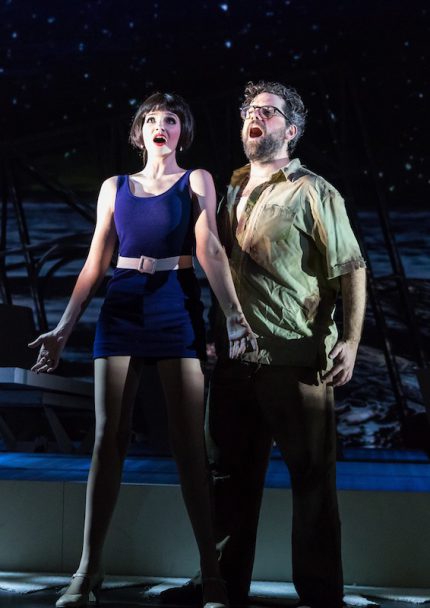Scant musical invention in COT’s “Invention of Morel”

First, credit where credit is due. It took over four decades for Chicago Opera Theater to present its first commissioned world premiere, and general director Andreas Mitisek is the man who pulled it off.
The company unveiled The Invention of Morel Saturday night at the Studebaker Theater, an opera written by Stewart Copeland, co-founder and drummer of The Police.
Inspired by the novella of the same name by Argentinian writer Adolfo Bioy Casares, the tale is a Borges-like meditation on reality and memory. A narrator recalls his mysterious past on an island as an escaped fugitive. A band of upper-crust tourists descend on the island and the fugitive falls in love with one of them, the young and beautiful Faustine. Yet because they exist in different dimensions of time, she cannot see or hear him. Morel, the scientist residing on the island who has invited the guests, ultimately reveals his invention of a special photography that will kill all the guests but allow them to live forever in an ever-repeating reality–a kind of fancy-pants, metaphysical version of Groundhog Day.
Mitisek and COT have produced an effective production for this much-anticipated premiere, with an excellent cast, tight stage direction by Jonathan Moore and atmospheric projections by Adam Flemming.
The problem with The Invention of Morel quite simply is Stewart Copeland’s music. It might have seemed like an edgy idea to commission an opera from a rock musician, in line with Mitisek’s view of COT as an envelope-pushing, alternative opera company. But Copeland isn’t Pete Townshend and The Invention of Morel ain’t Tommy.
Apart from some satiric, jazz-age dances for the formally clad tourists, the music is cast in a loud, uptempo rock idiom, which is fine as far as it goes. But the music never slows down or quiets to reflect the stage action. When the fugitive sings of his love for the unreachable Faustine, Copeland’s ceaseless rock machine just chugs loudly along unperturbed. There is a fatal lack of variety in the score, which for the most part is stubbornly unmemorable.
Copeland’s thick scoring is part of the problem. Perhaps it’s not surprising that a drummer would favor a lot of drum but the constant percussion-led balances made for a raw, aggressive sound that consistently slighted the winds and string quartet. The didactic, lumbering libretto–credited to Copeland and director Moore–doesn’t help matters (“I have come to believe that she may have been intrigued by my subtle little garden.”)
Much of the action concerns the Narrator recalling his time on the island as the Fugitive, and the device of having the two men double vocal lines gets tired very quickly. The opera seems to end multiple times in the final scene, but here Copeland shows more restraint, tamping down the drumming, and bringing out striking Prokofiev-like wind colors. The soaring vocal lines for the Fugitive, Faustine and ensemble in the finale offer the best moment in the entire opera, but also underlined the largely barren musical inspiration of the preceding 90 minutes.
The committed cast threw themselves into the proceedings with impressive dedication. Andrew Wilkowske and Lee Gregory each displayed a strong baritone as the Fugitive and Narrator, respectively, blended well in their many duetted moments and carried the action with dramatic urgency for most of the opera’s first half.
As the vampish Faustine, COT regular Valerie Vinzant effectively served as leggy eye candy in her bathing suit on the beach. But the soprano brought belated vocal power to the final scene and handled the stratospheric writing with assurance.
Rather than a mad scientist, the character of Morel in the opera comes off as more of an uppity maitre d’. Yet Nathan Granner showed a penetrating tenor as Morel that made one wish he had better music to sing. David Govertsen’s booming bass elevated the role of Stoever, and Kimberly E. Jones, Barbara Landis and Scott Brunscheen capably filled out the rest of the cast.
Mitisek conducted the chamber forces of the Fulcrum Point New Music Project well apart from not reining in Copeland’s omnipresent percussion.
The Invention of Morel will be repeated 7:30 p.m. Friday and 3 p.m. February 26. chicagooperatheater.org
Posted in Uncategorized




